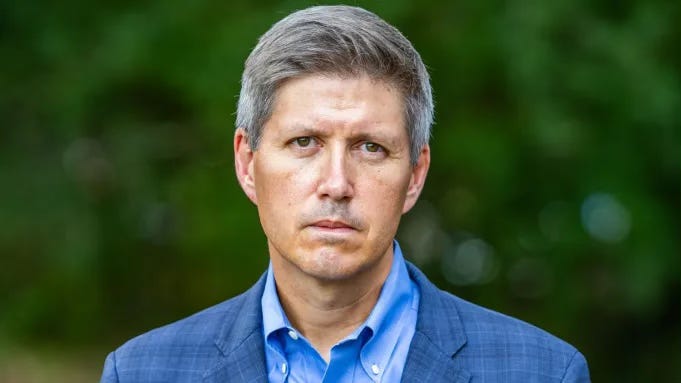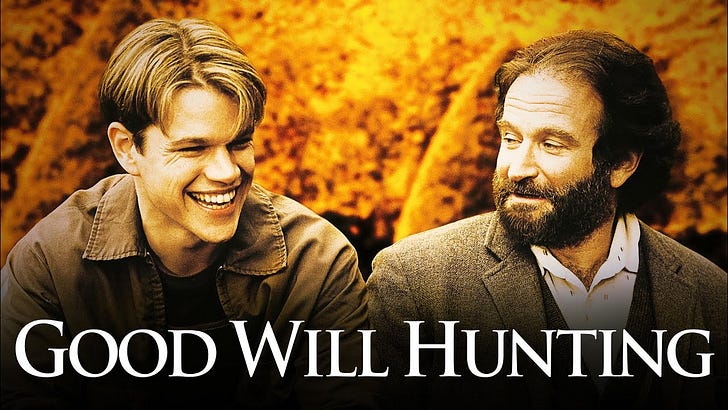Will Leitch writes. And writes. And writes.
The Central Illinois-native and diehard St. Louis Cardinals fan was the founding editor of Deadspin. His work appears regularly in New York Magazine and the Washington Post. He’s also the author of seven books, including Lloyd McNeil’s Last Ride, which dropped earlier this week. You should buy it.
Will hosts Seeing Red, a podcast about his beloved Cards (year-round, not just during baseball season), the movie podcast Grierson & Leitch, and MLB’s Morning Lineup. He’s busy, but graciously took a few minutes from doing book launch stuff to chat about the power of to-do lists, writing a million words a week, and why LeBron James is the best interviewer.
Three Point Four Media: In your Weekly Will newsletter, you include a list of everything you published the previous week. Last week, you wrote six columns and recorded five podcasts, and the newsletter intro is, I dunno, 1500 words about the University of Georgia graduation. Also there’s the book launch. What the hell, man? How do you have time to do all this stuff?
Will Leitch: I'm very organized. That's the big thing. I notoriously have a “shit to get done” list on a steno pad. I have a box of pads in the corner that I’m constantly replenishing from. Every day I update the list of what's going to get done. I do miss out on certain things because I'm working. I’m years and years behind on every television show. I haven’t started Andor.
My other advantage is that I write fast. Maybe this is an old blogger complaint, but sometimes there's this view that if someone writes fast, they're dashing something off. Charlie Pierce is famously another very fast writer. We talked about this, and he shared that same frustration. Just because I'm writing a little faster than everyone else does not mean I don't care. I see a blank page and I get to fill it. That’s amazing.
In college, Roger Ebert worked at The Daily Illini where I worked years later. He said that’s where he learned his three favorite words in the English language: “by Roger Ebert.” That sounds egotistical, but what it really means is he fell in love with the idea of creating something. I think my stuff is pretty good. I think it's holding up. I think I've gotten a lot better. Nothing anyone ever writes is going to be perfect. But I know that it exists. It did not exist before I made it, and now it does.
My editor said, "You are literally the second writer that's ever turned in his book on the day it was due. The other was the golfer John Daly.”
My goal when I started doing this was to get up every day and write about the stuff that I wanted to write about. I looked around and saw a lot of people who had better educations than me, were maybe smarter than me, had better depths of knowledge than I did, and maybe even more natural talent than I did. But I knew I could outwork them. At a certain level, I figured if I just kept writing, I would get better.
My version of your steno pads is a word file on the desktop of my computer called “To-do 2014.” In 2014, I started writing down my weekly to-do list: here's what I'm going to do each day. If it gets done, it gets deleted. I’ve been doing that for more than a decade.
I get a new sheet every day. There are always one or two things that fall through the cracks, so they go back up there the next day. But it helps me get things done, which makes editors want to work with me. I turned in God Save the Fan on the day the manuscript was due. My editor said, "You are literally the second writer that's ever turned in his book on the day it was due. The other was the golfer John Daly.”
I want to be the writer my editor doesn't have to worry about.
People ask me “who's your audience?” In a lot of ways, I’m writing for my editors. My job is to make their lives easier. I like my editors. I trust them. And also, the more they trust me, the more I can get away with. That’s always been a first principle for me: I want to be the writer my editor doesn't have to worry about. When they're not worrying about me, they might not be thinking about me, and they might forget to take stuff out that they might otherwise not.
What is your pitching process like?
My editor and I have to be on the same page. They tend to not force ideas on me, and I tend to not force ideas on them. It’s very organized. Monday morning, my list says to email Benjamin Hart, my editor at New York. I’ll sit down, write an idea if I have one or a couple ideas. I have a way of signaling if I’m not sure about the ideas or asking if he has anything in mind.
There’s a level of trust with all my editor relationships. Three or four times a year, there’s a “trust me, you should do this” or “trust me, let me write this” type of piece. Usually whoever proposes the idea is right.
A lot of writers go in and they treat editors, not adversarially, but like someone who is in the way. I was like that when I was 22. My view on editors now is that they are there to catch something that doesn’t make sense or isn’t thought through well enough. At other publications, there are times I feel like the editor is not protecting the writer. I can see the editor thinking “this piece will get everywhere if the writer looks a little bit like a fool.” That’s my nightmare. I've said some stupid stuff in first drafts and even stupider stuff in pitches. To have that kind of trust is a pretty big deal.
Carmelo Anthony is the second person I told that I was going to be a father for the first time.
Are you looking for new places to write?
I'm always game. I have a lot of freedom and a lot of comfort with the places where I write already, so I don't feel like I have to send out a lot of pitches. But, for example, The Atlantic. I only occasionally write for them. There's a more formal pitch process. I have my editor there, but I don’t have the relationship with them that I have with Benjamin Hart. I read that publication all the time, and I know when a piece would work there in a way that wouldn’t in New York. I would never send The Atlantic something that New York rejected or the Washington Post rejected. It’s always because it’s a fit for that publication specifically, rather than I want a wider scope or I want more money.
You’ve written some longer features but you’re not a “features writer.” When you were growing up dreaming of being a writer, did you want to write features?
A couple years ago, I wrote a big, long feature for New York about More than a Vote, LeBron James’ originally very ambitious, and then mostly abandoned, get out the vote program. I would have written it very differently 10 years ago. A decade ago, I would have been like “I'm writing a feature, and I'm going to do all the feature things.” And now I'm like, “Oh, I'm writing a feature as Will because this is how I write.”
There were certain writers and certain magazines that I loved, but I was never really interested in the idea of being that bon vivant magazine writer who goes out and gets the long celebrity profile or does some sort of travel log. They felt like they were outside my reach. And they always felt weirdly indulgent for work that was entirely dependent on things that had nothing to do with the writer.
When Carmelo Anthony came to New York, I did a long feature about him for New York. Carmelo Anthony is the second person I told that I was going to be a father for the first time. I literally had just found out the day before, and I was like, “I'm sorry. I know I have a job to do but wow!” I didn’t put it in the story, obviously, but it informed the entire story. He was so cool, and had great advice.
Roger Ebert was a film critic, but some of his best stuff were the celebrity stuff he did. He always did the best Woody Allen interviews. (I know people love it when you talk about Woody Allen these days.) The people he was talking to respected him and knew him, and he was a name in his own right. Celebrity interviews now are just not like that anymore. One of my favorite celebrity interviews recently was Ryan Coogler in Interview. You know who did the interview? LeBron James. That kind of peer behind the curtain is so much harder to do because everyone's so much savvier about media now.
I think I was probably more shameless in my 20s than I remember.
What is a 20-year-old Will, a guy with the same ambitions you had when you were 20, doing today? I realized a few years ago that I had no idea how to tell someone starting out in journalism what to do anymore. It’s too different in form and function from when I started.
I think about this a lot as I see people my age or older doing things that I know they don't like to stay in the business. I realized that there was going to be a ceiling for me because I did not like talking into my phone to strangers. It feels unnatural and weird to me, and fake. When I was doing the Sports Illustrated talk show, I did a Facebook Live. I felt like an idiot. But my kids don't have that issue, and their friends don't have that issue.
I don’t know what works anymore. And on some level, I don’t want to know. I’ve been very fortunate, knock on wood, to be in a position where I don't have to be as shameless as you have to be when you are starting out. That said, I think I was probably more shameless in my 20s than I remember. At a certain level, starting a blog in 2005 took a certain “look at me”-ism. It took a certain ambition to try to push your name out there and do whatever it takes, even if it was uncomfortable for you.
It's easy for me to say, “Oh, well, I don't like talking into my phone,” or “I don't like tweeting all the time.” I'm not good at social media. There are people my age who are great. Spencer Hall is amazing at social media. To be good, you have to be on it all the time. You have to be in the Borg all the time. I have to get stuff done, and I’m not interested in it. I know it’s not going to help me write the things I want to write. But I don't know if that would have been the case if I was 20.
If I were 20 right now with the personality that I had, I think I'd probably be doomed. But also, I think I was thirsty when I was 20, just in a different context. And so whatever that thing is that I'm uncomfortable doing now, it probably would have come naturally to me then, and, therefore, I wouldn't think about it.
What else are you working on?
We sold the movie rights for Lloyd McNeil’s Last Ride to Lionsgate. It’s nice that a studio bought them. I'm actually an executive producer on the project, and as soon as I find out what an executive producer does, I will produce executively in a very serious way.
I'm not interested in writing screenplays. I'm just not. They're going to hire someone to write the screenplay. I've talked to some writer friends of mine who have sold books that have been made into movies before. The thing they always say is you don't have anything to do with the process. The only thing you need to do is do your best to get it made.
Right now, that's the big plan: Find out how this movie stuff works and what an executive producer does. And also get my kids into middle school together.
I didn’t realize that was a thing you had to do.
The other day we had to bribe my older son to read the book. He was reading it, and he laughed. I wasn't here, but my wife was. She asked him what was funny and he said he couldn’t believe he laughed at something his dad wrote. He denies it now because I wasn't in the room and he says the rest of the book sucks.
What was the bribe?
Ten bucks. He hasn’t finished the book yet, so he hasn’t gotten it yet. It’s like a chore. If I had the money, I would do it with everyone.
“How do you describe a technology that feels very sci-fi but is quite real?”
Carissa Justice wants people to celebrate brand language, not just the cool new logo. She’s the founder of Nimble, a writing and brand studio that does great work for clients like Strava, Figma, and Google X’s new start-up Taara. She also runs The Subtext





